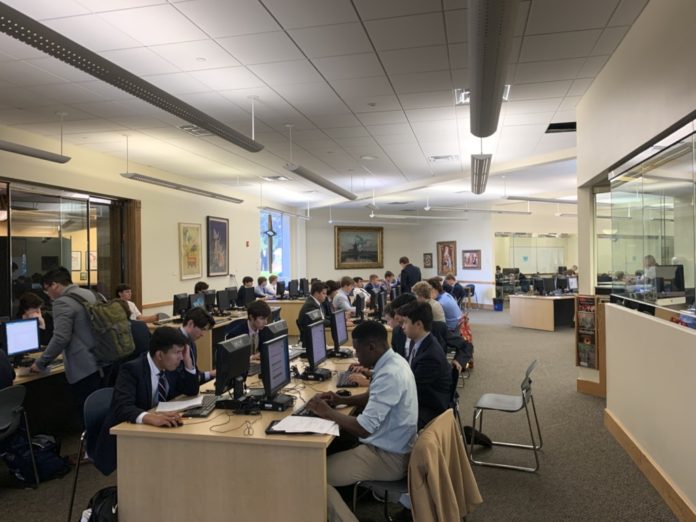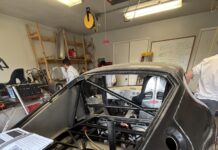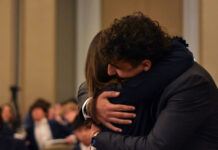Coming from a public school, I never had the experience of an end-of-semester exam until my freshman year of high school. I remember my first ever December Assessment at Jesuit was Pre-AP Biology, and I was a nervous wreck, no idea what to expect nor really how to prepare.
However, having now studied for and taken nineteen December Assessments with nine of those being for honors or AP classes, I like to think I have somewhat cracked the code on how to succeed on finals at Jesuit. So, in the spirit of Christmas, I would like to share with you, the possible Jesuit student reader, my tips, and what I have learned on how to get that A on your December Assessment.
Start in Advance & Don’t Cram
I know this probably sounds cliché. I think every teacher I have had has preached this idea, but we as students have this innate response to believe that they do not know what they are talking about because they teach the class and write the test, not take it. I speak from experience when I say that they are right.
I tried the cram method freshman year, and while I still did very well on my assessments, I had to endure a lot of pain and lack of sleep in the nights before the respective exam. Going through long algebra and Spanish reviews the night before is not fun in any way, shape, or form. It also has been scientifically proven not to be an effective way to study.
Starting sophomore year (and even with some of my May Assessments freshman year), I began preparing for my exams a week out in advance at a minimum. By doing no more than fifteen to thirty minutes a night on each class starting at the beginning of “dead week” up to the night before the exam, I felt like I had learned just as much if not more versus the cramming method (and I also was able to get a full eight hours of sleep).
Of all the tips I could tell someone who wants to do better on preparing for their exams, I would say that this is arguably the most important criteria because it is what so many Jesuit students struggle with.
Talk to Your Teachers
Contrary to popular belief, teachers are not trying to drop your grade by five points with the December Assessment. If that were the case, it would have made Ms. Sanchez’s act of kindness by handing out mini candy canes during my junior year AP Chemistry assessment far more ominous.
From my experience, the teachers at Jesuit want to help their students in whatever way they can, especially for the assessment. Whether it was a content question or a concern regarding the logistics of the test (ie-how to manage time), they have always been very accessible and straight forward in their assistance. Also, when you go to talk with a teacher outside of class for help before the assessment, they might even drop some hints on major topics covered on the exam.
Especially for English exams, which tend to be preparable timed writes, be sure to actively talk with teachers to make sure that you are on the right track for an outline or anything else that is vital to the exam.
Make Your Own Review
This tip holds especially for AP courses and history courses, which have lots of content that one needs to remember for the exam. While making a comprehensive review guide can be a grueling process, the benefit of doing one rather than leeching off of someone else’s has many upsides.
For one, you have to realize that the process of writing the study guide is in and of itself studying. I remember spending hours and hours writing a massive AP World History review for the December Assessment. I thought when I finished it that I did not want to ever look at it again because of how long it took me to make and also because there was so much to read through. However, in reading over the completed review, I realized that I had learned a lot of information by writing the review itself (killing two birds with one stone).
So, if you want to do well on your exam (especially if it is for an AP class), put in a few extra minutes and create your own study materials. It definitely pays off.
Relax
I struggle the most with this aspect, but it is something that I need to learn how to do better. It is very easy on the morning of a notoriously hard exam to have high anxiety as you aimlessly flip through a review Google Doc or packet. One thing I have had to convince myself of is to go into the exams with a slight amount of cockiness. By telling yourself something as simple as, “I know all this stuff,” you will probably know that stuff better. The sense of confidence will help lower your stress levels which in turn will allow you to think clearer.
I can also say from my experience with these exams that when I get stressed, I do not work better and instead usually blank. It is not until I take deep breaths that everything I studied starts to come back to me.
So, the morning of the exams, rather than try to cram in information (because you will not remember it come the exam, trust me), eat some food, talk to friends, and know that one test is not going to be the make-or-break of your high school career.
Teacher’s Take
Dr. McFarland, a senior AP teacher, advises that students need “to remember to breathe – that helps your brain actually function better.
“Second, it may seem counterintuitive – but sometimes when studying for an exam, focusing on the material you are feeling comfortable with can help you build on strengths rather than thinking that you need to focus exclusively on the stuff you don’t know. It can then help you to think analogously – when confronted with stuff you are less comfy with, you can think about how the skills or content is related to what you are comfortable with.
“And last but not least, when in doubt seek help – there are great opportunities to get help in the math lab, study sessions, and other one-on-one help whether with your teacher or someone else who teaches the course.”
Mrs. Souders, when asked what her ideal advice for students is, said, “My ideal advice would be looking at material in advance. Some of the best things students do is taking time at the beginning to see how long they need to study for each test. If you have a plan, you go in much more confidently, and you can see if you need to get notes before the night before.”
Ms. Krusekopf said that her number one tip would be to “pace yourself and start early.”
Student’s Take
Dagmawe Daniel ’20 says that his number one tip would be “studying ahead of time and meeting with your people. For liberal arts classes, it is best to have a plan and meet with your teacher. Your teacher is your best source so you should meet with them outside of class. Ideally, you should start about two weeks in advanced for studying. Being sleep deprived in the past has hurt my performance.”
Jacob Phillips ’20 also commented that his top tip would be “don’t stay up late the night before. Go to bed.”
Holland Ernst ’21 gave three tips for success on finals: “don’t procrastinate studying (spread out studying across dead week for each class), don’t study for super long periods of time on the same subject, and create an outline/review for each class and make a checklist when studying.”
Stay tuned to The Roundup for more on Jesuit academics!






